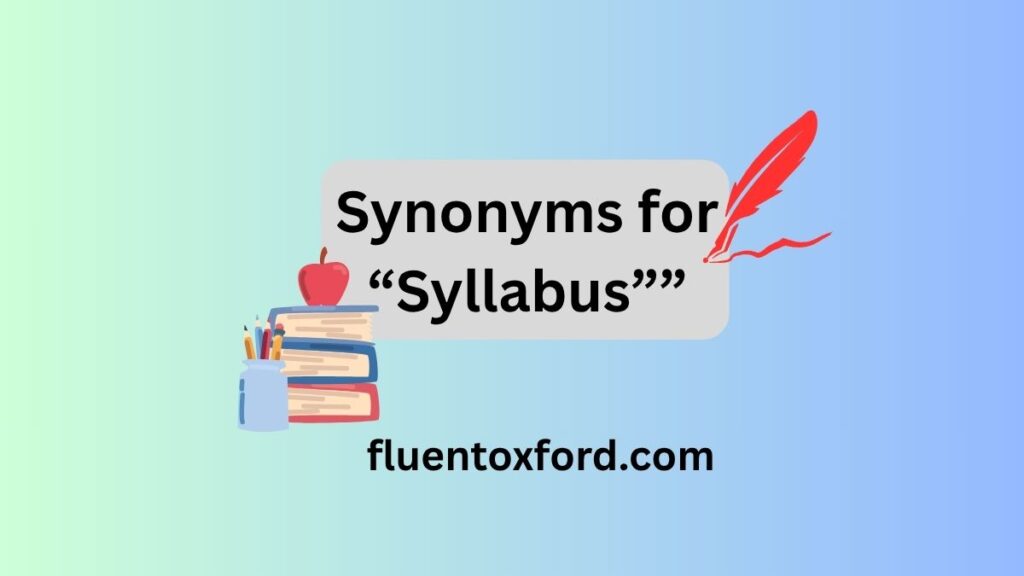The phrase “Plural Of Syllabus: Syllabuses Or Syllabi” refers to the grammatical forms used to express more than one syllabus, a noun commonly used in academic contexts to describe a course outline. In English, forming plurals can follow different rules depending on a word’s origin. “Syllabuses” follows the regular English pluralization pattern by adding “-es,” while “syllabi” is derived from Latin, reflecting its classical roots. Both forms are technically correct, but their usage depends on stylistic preference and context.
In the world of language and education, few things spark curiosity like discovering that a single word can have two valid plural forms. This linguistic twist creates a moment of surprise and intrigue, especially for learners and educators. It’s not just grammar—it’s a peek into the fascinating blend of English and Latin that still shapes the way we communicate today.
When diving deeper into the Plural of Syllabus: Syllabuses or Syllabi, it becomes clear how language evolution affects even the most familiar academic terms. The choice between “syllabuses” and “syllabi” offers a unique glimpse into formal versus informal tone, traditional versus modern usage, and how English accommodates words from other languages. Understanding the Plural of Syllabus: Syllabuses or Syllabi, can enrich one’s appreciation for linguistic diversity and grammatical flexibility.
What Does “Syllabus” Actually Mean?
At its core, a syllabus is a syllabus document that outlines what a course will cover.It includes topics to be covered, learning goals, required materials, assignments, and exam dates. The syllabus helps students understand what to expect and how to succeed. It acts as a contract between the teacher and students. It acts as a roadmap for both teachers and students. Here’s what a typical syllabus includes:
- Course Title and Code – Name and identification number.
- Instructor Information – Name, email, office hours.
- Course Description – Brief overview of content.
- Learning Objectives – What students will learn.
- Required Texts or Materials – Books, tools, or software.
- Grading Criteria – Breakdown of grade components.
- Assignment Schedule – Due dates and topics.
- Exam Dates – Test times and formats.
- Class Policies – Attendance and behavior rules.
- Late Work Policy – Rules for missed deadlines.
- Academic Integrity Policy – Rules against cheating/plagiarism.
- Contact Hours – Weekly in-class learning time.
- Office Hours – Instructor availability for help.
- Supplementary Resources – Extra readings or support materials.
In academic settings, the syllabus is often treated as a contractual agreement between instructors and students. It provides structure and sets expectations from day one.
But this word isn’t limited to college. Training programs, corporate workshops, and even online classes often use a syllabus or course outline to organize content.
What Is the Correct Plural of Syllabus?
Here’s the short answer: Both “syllabuses” and “syllabi” are correct
That’s right—you can use either form, and grammar experts will agree with you. However, there are subtle differences worth exploring.
| Plural Form | Type | Common Usage |
| Syllabuses | Anglicized | More common in modern English |
| Syllabi | Latin-based | Traditional, formal writing |
When to Use Syllabuses
Use syllabuses when writing in:
- Casual or conversational tone
- Modern American or British English
- Professional or business writing where simplicity is preferred
When to Use Syllabi
Use syllabi when writing in:
- Academic or scholarly tone
- Classical or formal English
- Institutions with a preference for traditional grammar
Tip: Always stay consistent. Don’t switch between “syllabuses” and “syllabi” in the same document.
Why Are There Two Plurals?

This is where it gets fascinating—and a little nerdy. Let’s dive into the morphology of the word.
Syllabus is a loanword adaptation. It came from Latin, but there’s a twist: it was actually a mistake. The original Latin word sittybos was misread in medieval manuscripts, and syllabus was born.
Because of this quirky history, the word falls into two camps:
- Those who favor Latin pluralization (syllabi)
- Those who use standard English pluralization (syllabuses)
The Role of Language Roots
English borrows heavily from both Latin and Greek. As a result, some words retain their original inflection, while others evolve.
Think about these examples:
- Cactus → Cacti
- Focus → Foci
- Octopus → Octopuses (not octopi, which is technically incorrect)
So while syllabi feels more scholarly, syllabuses is just as correct—especially when following English grammar rules.
Is “Syllaboi” a Word?
No, syllaboi is not a word—and never has been.
It’s a common mistake. People assume that because some ancient words have Greek origins, they should take a Greek plural. While syllabus sounds Greek, it isn’t. In fact, it was misclassified due to a lexical ambiguity in the original texts.
“Syllaboi” may appear logical to some due to its classical sound, but it is not recognized in dictionaries or academic settings. Always choose “syllabuses” or “syllabi” for correct usage.
Quick Breakdown:
- Correct: syllabuses, syllabi
- Incorrect: syllaboi (completely made-up)
“Syllaboi” might look scholarly, but using it in your writing is a surefire way to lose credibility.
Origins of the Word “Syllabus”

Here’s where it gets interesting.
The word syllabus came into English in the 17th century. It’s a product of a printing error in a Latin translation of a Greek text by Cicero. The original term was sittybos, which referred to a parchment label or title slip. Over time, the mistaken term syllabus entered common use and became associated with course outlines.
Word Origins Recap:
- Greek: sittybos (original term)
- Latin: syllabus (based on misreading)
- English: adopted and widely used
This mix-up is a perfect example of how English pluralization isn’t always logical—it’s historical.
Other Words Ending in -US and Their Plurals
To better understand how syllabus behaves, let’s compare it to other -us ending nouns.
| Singular | Latin Plural | English Plural | Notes |
| Syllabus | Syllabi | Syllabuses | Both accepted |
| Cactus | Cacti | Cactuses | Both are valid |
| Nucleus | Nuclei | Nucleuses | Nucleuses is rare |
| Fungus | Fungi | Funguses | Funguses is mostly used in medical fields |
| Focus | Foci | Focuses | “Focuses” more common in modern use |
| Radius | Radii | Radiuses | “Radii” in science, “radiuses” informally |
As you can see, loanwords evolve over time. Some retain their Latin inflection, while others get Anglicized plural forms.
Real-World Usage in Context
Let’s see how syllabus, syllabuses, and syllabi appear in actual writing.
Singular – Syllabus
- The professor emailed the syllabus last night.
- A well-structured syllabus includes grading policies and attendance expectations.
- The syllabus outlines the course objectives.
- I received the syllabus on the first day.
- Her syllabus includes weekly quizzes.
- This syllabus is very detailed.
- The professor handed out a new syllabus.
- We reviewed the syllabus together in class.
Plural – Syllabuses
- Most syllabuses are distributed on the first day of class.
- Different departments have different syllabuses based on their curriculum.
- All the syllabuses are posted online.
- The university requires updated syllabuses each term.
- I compared the syllabuses of two similar courses.
- Teachers submitted their syllabuses before the semester began.
- Different professors use different syllabuses.
- The department reviewed all course syllabuses.
Plural – Syllabi
- At the conference, instructors shared their syllabi for peer review.
- Some universities archive syllabi for public reference.
- The professor updated several syllabi over the weekend.
- These syllabi are stored in the archive.
- I printed all the required syllabi.
- Old syllabi show how the course evolved.
- The academic board approved the new syllabi.
- Comparing past syllabi helps in course design.
Synonyms for “Syllabus”

Depending on your context, you might want to use a synonym—especially to avoid repetition or to match tone.
Formal Alternatives:
- Curriculum – refers to the overall content taught in a school or program.
- Course outline – structured layout of topics and activities.
- Program of study – broader than a syllabus; usually spans multiple courses.
Informal (Use with Caution):
- Lesson plan – specific to individual classes, not the whole course
- Study guide – supplementary, not a substitute.
- Class plan – vague, better avoided in academic writing.
Conclusion
Understanding the Plural of Syllabus: Syllabuses or Syllabi, helps us see how English accepts both regular and borrowed word forms. “Syllabuses” is more common in everyday use, especially in modern writing and speech. On the other hand, “syllabi” sounds more formal or traditional, and is often used in academic or scholarly contexts. Both are correct, so it’s really about choosing the one that fits your tone.
The topic Plural of Syllabus: Syllabuses or Syllabi, shows how flexible and interesting English grammar can be. It’s a simple example of how words can come from different languages and still work together. Whether you use “syllabuses” or “syllabi,” you are still using proper English. Knowing both forms gives you more control over your writing and helps you sound more confident and accurate.
FAQs
Q1: Which is more commonly used today—syllabuses or syllabi?
A: Syllabuses is more common in modern English, especially in academic and professional settings.
Q2: Is “syllabi” still grammatically correct in 2025?
A: Yes, syllabi remains correct and is often used in formal or scholarly writing.
Q3: Do major dictionaries accept both plural forms?
A: Absolutely. Dictionaries like Merriam-Webster and Oxford list both syllabuses and syllabi as correct plurals.
Q4: Does the APA Style Guide recommend one plural over the other?
A: APA allows both forms but emphasizes consistency—pick one and use it throughout your text.
Q5: Are both forms accepted in academic institutions globally?
A: Yes. Universities and colleges in the U.S., UK, Canada, and Australia accept both, with syllabuses slightly preferred in the U.S. and UK.

As an admin at Fluent Oxford, Maida Queen is the driving force behind our vibrant learning community. With a deep passion for English language education, she ensures that our platform remains a dynamic, engaging, and supportive space for learners worldwide.
Maida expertly manages content, assists users with their grammar and fluency queries, and fosters an interactive environment where learning feels effortless and enjoyable. Whether you need guidance, motivation, or just a friendly face in the Fluent Oxford community, Maida is always there to help you reach your English language goals.








